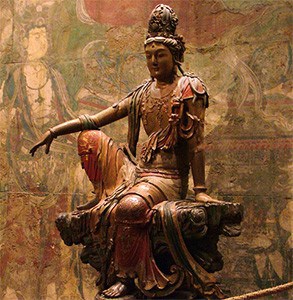Building courage and compassion

Letter from Frank
Hi Venerable Thubten Chodron,
Recently, I’ve been in somewhat of a dilemma about my spiritual life. I’ve learned quite a lot about the majority of people in this country and have come to the conclusion that many people are very exclusive; they make friends with people based on superficial traits, such as good looks and a good sense of humor. They don’t really care if someone is kind, compassionate, or intelligent. Friendliness has little effect on them. They are insensitive: I heard one guy joke about the men who were beheaded in Iraq. This kind of thing makes me sick to my stomach.
This has made me very disheartened. I harbor a strong dislike for such people and that has made me discouraged about keeping my bodhisattva vows. I can’t really connect with people like this, since they just want to party and have fun. Many of them cheat on their significant others just because they have the chance to. This has really affected my spiritual progress, because so much aversion has risen and clouded my mind.
My problem is that I think I became a practitioner of the middle scope—someone who aims for their own liberation from cyclic existence. I seem to have lost my will to help others or to attain enlightenment for their benefit. Since I began practicing Buddhism, there have been a few times when there was a chance for me to help other people by giving them advice. I didn’t call the advice “Buddhism,” but just told them things that could help them in life. But they ignored my advice and didn’t even try it out. This has made me doubt whether or not I can actually help people.
Currently, I no longer believe it’s possible to reach out to any of these people during this lifetime. However, sometimes I am grateful to those who supported my Dharma practice. So my altruism at the present moment is only towards those who are kind or who have been generous to me. I have no desire to extend my altruism to those who are hateful, exclude other people, and are arrogant. My plan now is just to practice and act as a good example in hopes that I can influence people through my example.
Should I force myself to do meditations on love, compassion, and altruism? I don’t really feel like it. My plan is to gain more wisdom. Then, when I eventually realize the true nature of suffering and break away from it, I will understand the real situation that all sentient beings are in. Perhaps then compassion will arise.
What do you think?
Yours,
Frank
Venerable Thubten Chodron’s response
Hi Frank,
Thanks for writing to me about this. It’s an important issue that many people come up against in trying to live with compassion and altruism.
It’s true that many people choose friends for very superficial reasons and many don’t treat their friends or partners very well. It’s sad, because through this behavior they create a lot of problems in others’ lives as well as in their own, and they also create a lot of negative karma that will ripen in their experiencing suffering in the future. So even though they want happiness, due to their minds being under the control of ignorance, anger, and attachment, they create so much suffering and causes for suffering for themselves and others. It’s precisely for this reason that feeling compassion for them makes sense. They’re ignorant and harming themselves, even though they have precious human lives that can be used to create happiness and its causes. It’s sad, isn’t it? It’s a situation worthy of compassion.
It’s also a situation that we fall into as well. How many times have we excluded or ignored others? Or chosen friends for foolish reasons? Or been unappreciative of those who have tried to help us? When we look at our own lives, we can find many times when our ignorance, anger, and attachment have obscured our minds so that we’ve made dumb decisions or done harmful actions. We understand the person we were that did these things. We can have compassion for him or her. We see that we still have Buddha potential and good qualities. If we can have compassion and patience for ourselves, then we can give up judging others who do the same things and have some compassion for them.
Our disappointment in others often comes because our expectations are too high. We’d really like others to be perfect (whatever “perfect” means). And if they can’t be perfect, we expect them at least to listen to our sage advice and change their lives, ideas, and behaviors so that they do what we think is best for them.
When we examine these expectations, we see that they are pretty ridiculous. Our own ability to give wise advice is limited by our own ignorance. Sometimes we give good advice but at an inappropriate time. Sometimes the way in which we give advice isn’t very skillful and it sounds more like we’re ordering someone around, judging them, or trying to run their lives for them. Other times we give advice when it hasn’t been requested. Part of our own process of growing in the Dharma is learning how and when to make suggestions.
We can’t control others (at present, we can’t even control our own mind!), so when we give advice, it’s best to also give the person space to think for themselves and make their own decisions. Sometimes someone will reject suggestions at first. Still, a seed has been planted and later on they may remember our suggestions and be open to them. After all, many people have given us advice that we’ve disregarded. We’ve even gotten angry at them for giving advice. Yet, later on, we’ll re-think the situation and realize that their advice was sound and adopt it at that time.
It’s helpful to remember that the few people whom we don’t seem to connect with well aren’t representative of all sentient beings. The karma may not be there at that moment to help those particular people, but the karmic connection to help many others may be present. Thus there’s no reason to think that it’s impossible to reach out to sentient beings.
We can use the fact that people are stubborn and suffer from disturbing emotions and detrimental values to increase our compassion for them. It’s easy to love and be compassionate towards people who are nice to us, who agree with our opinions, and who do things our way. Even animals love others who are like that. Dogs love the people who feed them and growl at strangers who come into their territory. If we have compassion for friends and ignore or hate others who don’t appreciate us, ignore us, or don’t do things the way we do, we’re not so different from animals. It’s important to recall that we have precious human lives as well as the incredible fortune to meet the Buddhadharma, so we can do better than animals. Sure, it takes perseverance and patience on our part to develop stable love and compassion, but we have the potential to do so. These qualities are so valuable to ourselves and others that it’s worth the effort on our part to cultivate them.
If we can develop qualities like those of the bodhisattvas, then the people that we have a hard time with now will have an example in their lives of the benefits of cultivating a compassionate heart. That could make them re-think their values and actions. In that way we would benefit them greatly.
Even though others may be superficial and stubborn now, they will not always be that way. People grow and change. In the meantime, we can make prayers for them and do metta meditation for them, thinking, “May they be well and happy. May they be free from all wrong conceptions. May their inner potential blossom so that they value people who are kind, and may they treat their friends respectfully. May their lives become meaningful by meeting the Buddha’s teachings. In their lives may they solve more problems than they create and bring joy to others. May they cultivate altruism and become fully enlightened Buddhas.”
Clearly it’s our own selfishness that causes our altruistic motivation to decrease and makes our mind think only of our own spiritual advancement and forget about others. That same self-centeredness is our enemy—it is what makes us lie, cheat, and talk behind others’ back. Following the desires of our self-centered attitude isn’t very wise. So just because it may be easier for us to think just of benefiting ourselves and those who are nice to us, letting self-preoccupation have a foothold in our mind is dangerous.
We are dependent on others in every aspect of our lives, and because of this, we say that others have been so kind to us. For example, we need classmates in order for the school to exist. A school with good teachers won’t be built just for us. If we want to study in a school, we depend on others going there as well. The roads we drive on were built by others, so was the place we live. Our food came from others. Sentient beings have been so kind to us in so many ways. Even if we don’t see any direct benefit received from someone this life, we still know they’ve been kind to us in previous lives.
Furthermore, where would we be if the Buddhas and bodhisattvas gave up on us and said, “Oh, Frank and Chodron, they’re just too ignorant. We’ve been trying to lead them to enlightenment since beginningless time and they still use harsh speech and engage in idle talk, not to mention the fact that they are so attached to having things their own way. We’re fed up with them. We’re going to go into parinirvana and let them fend for themselves in samsara.” Where would we be if the holy beings did that?
Seeing that they have great compassion and don’t give up on us even though we continue to make unwise decisions and do foolish things, then let’s not give up our bodhi resolve towards other beings. Sure, at present our bodhicitta isn’t as strong as that of the holy beings, but slowly, slowly we can strengthen it so we become like them. If they can bear hardship for our benefit, we can develop the courage inside of ourselves to bear hardship for the benefit of others. Once we do, those hardships won’t appear so difficult to us. We’ll be able to act compassionately and kindly in a way that we can’t even imagine at present.
Please think about this. The strength to follow the bodhisattva path exists inside of you. Tap into it.
Venerable Thubten Chodron
Venerable Thubten Chodron
Venerable Chodron emphasizes the practical application of Buddha’s teachings in our daily lives and is especially skilled at explaining them in ways easily understood and practiced by Westerners. She is well known for her warm, humorous, and lucid teachings. She was ordained as a Buddhist nun in 1977 by Kyabje Ling Rinpoche in Dharamsala, India, and in 1986 she received bhikshuni (full) ordination in Taiwan. Read her full bio.


